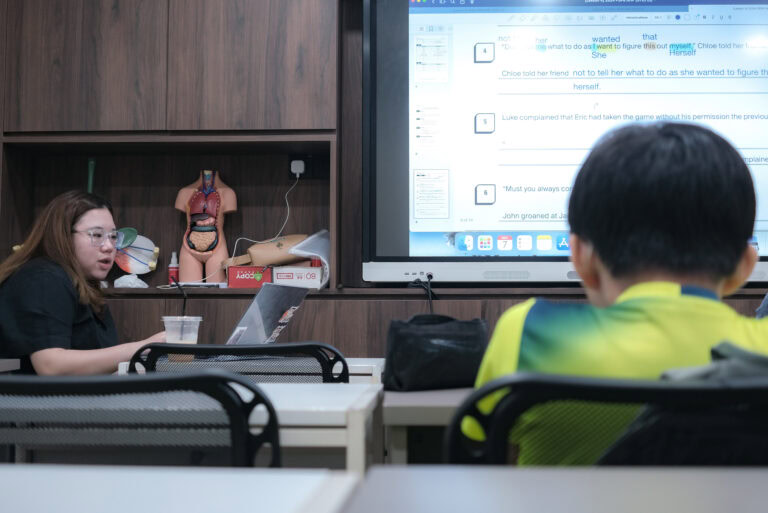Meet Teacher Evette, Head of TTA’s Primary School English Curriculum Development team.
Passionate and dynamic. She is known for her ability to captivate and engage her students while consistently achieving stellar examination results at school. Armed with her unique teaching style and unwavering dedication, Teacher Evette inspires each of her students to gain a deeper appreciation of the English language.
In this interview article, we shine the spotlight on Teacher Evette. We ask her about her love for the English language and how she cultivates that in her students. We also take the chance to find out why she chose teaching as a career and her dreams for every student under her tutelage.
Q: You could have stayed and done well in the corporate world, why teach?

A: Absolutely, I could have stayed in corporate but I did not enjoy the environment nor the work I was doing. Initially, I thought it was because I was in the wrong role or industry. However, after trying out a couple of industries and roles, from banking to Venture Capitals and then to consulting — I realised that I was the happiest and most fulfilled when I was involved in youth development and education. I needed to do what I like to do for a long time and consistently. That said, I do not regret my time in corporate as my experiences allow me to share interesting stories and information beyond the four walls of the classroom, with my students. Diving deeper as to why teaching, I enjoy the creative process of breaking down new and complex materials into teachable sections. I love the hours I spend in the classroom interacting with my students and listening to their stories. I also find great value in the fresh perspectives my students provide! Their unique (and often less jaded) outlook on issues offers me new angles to consider. Above all, witnessing my students grow over the years into people of their own is my greatest source of purpose and motivation to stay in the teaching profession.
Q: Why did you choose to teach English?

A: Growing up, I was not a verbally expressive child and I often struggled with articulating my thoughts. However, I found it fascinating and thankful that books were able to help me put my thoughts into words. As my proficiency in English improved, I was finally able to give voice to my innermost thoughts and communicated with others more effectively. I went on to study H2 English Literature in Junior College and that was when I realised that English is truly a beautiful language and I would choose to teach it in a heartbeat if I were to become an educator. The elegance with which words can be woven together never ceases to amaze me, and I am touched by its power to resonate with me.
Q: What is your favourite word in English and why does it hold a special place in your heart?
A: My favourite word would have to be “happy”. Living in a fast-paced and competitive society like Singapore, it can be all too easy to overlook our own well-being. It is special to me because I would like to be someone who does not forget to be happy no matter how caught up I get with life. A little TMI but I have the phrase “don’t forget to be happy” as my phone wallpaper 🙂
Q: How do you create a stimulating and engaging environment for your student?
A: I try to utilise a variety of teaching methods such as a mix of instructional techniques. Some days I go old school (lecture style) when there is an absolute need for focus, especially leading up to and during critical examination periods. On other days, whenever I get the chance to, I get students to role-play or employ interactive technology tools to keep students engaged and lessons enjoyable. This variety helps cater to different learning styles and keeps students motivated. I often encourage student-led discussions and active participation in class too. It is an open secret that when students are active agents of their learning, they stay engaged and foster critical thinking skills.
Q: How do you help your students develop a love for the English language?

A: To that end, I provide relevant materials and knowledge that link classroom content to real-life situations in my lessons. For instance, in some Grammar classes, I intentionally jumble up the sentences and get my students to decipher it. Whenever I conduct this exercise, you can see the head scratching, furrowed bros and the endless “huh” that fills the classroom! Through this simple exercise, my students discover that if they want to be understood, they need to use the correct Grammar rules and syntaxes. Additionally, I believe this is where my experience in the corporate world and a Sociology graduate also prove invaluable. Drawing upon my background, I often find myself equipped to engage my students in discussions about various real world issues with ease. Ultimately, when students see the relevance of what they are learning, they are more likely to stay engaged and motivated rather than seeing it as “just another subject”, and hopefully come to love the subject.
Q: Could you share a challenging situation you face in the classroom and how you effectively handled it?
A: In my first year as a teacher, I had some students who required additional support and attention in the classroom. Hence, I expended most of my attention towards assisting them. This inadvertently caused others to feel neglected. Occasionally, a few students voiced their dissatisfaction in class. Although I could not directly address the reasons for my differentiated attention, a turning point occurred when a student burst out in class, exclaiming, “You’re so biased! Why is it always me who must help? Why is it acceptable for Student A to do this but not me?”
While taken aback and hurt by the outburst because it was never my intention to make my students feel that way, I felt a deep sense of gratitude. This incident highlighted the importance of maintaining a balanced approach to attending to every student in class. When class ended, I approached some of them to discuss the issue openly. I began by apologising for neglecting their feelings and took the opportunity to share the reasons that had necessitated my differentiated attention. Fortunately, my students displayed understanding and maturity. They were aware of the complex class dynamics at play. However, this still served as a poignant reminder that regardless of their maturity, my students should always receive equal care and support from me.
Q: If you could have a teacher’s ‘superpower’ what would it be and how would you use it to enhance your teaching?
A: It is no secret that teachers have to talk a lot and I would like to be able to speak for extended periods without straining my throat. Just imagine all the possibilities! With such a superpower, I will be able to share more stories, deliver engaging lessons and provide thorough explanations.
Q: Can you share a lesson or an activity that you have found particularly successful in engaging students and promoting active learning?
A: One of my favourite activities in class involves selecting headlines from news sites and strategically blanking out certain words. This activity was created when I found teaching Comprehension Cloze in class to be mundane and students seemed disengaged. I tried it out with my P6s and they loved it. It not only reinforces the relevance of the vocabulary we cover in the classroom but also provides an invaluable opportunity to discuss current affairs with my students, especially topics surrounding the pandemic! This enables them to articulate their thoughts and ideas using the vocabulary and grammar rules they have learned in class. Through this process, they not only gain proficiency in language expression but also develop the ability to formulate coherent arguments, which are important communication skills.
Q: What is your hope or dream for every single child that you have taught and will teach?
A: My wish for my students is that they will be able to develop a perspective that transcends binaries and encourages open-mindedness. Rather than accepting absolute or one dimensional narratives, I hope that my students are able to consider complexities and nuances, carefully evaluate multiple perspectives, before making their own informed opinions. Ultimately, I hope for their study of the English language to be a means to that end.
Q: Finally, I would like to find out more about your hobbies and life outside of teaching. If you could do something for a living where you do not have to worry about how high or low the job pays, what would that be? Oh yes, please do not say teaching.

A: For now, I would love to be a strawberry farmer! There’s really no deeper meaning to it but I just think that it would be nice to wake up in a place where I’m away from the hustle and bustle of the city, have a cup of morning coffee then head down to a vast plantation dotted with a little red. I’ll start my day by picking the strawberries and the evening are dedicated to creating different types of food with them.
This article was proudly written for you by the Think Teach Team. Every year, we impact over a thousand students and empower them with our smart techniques to achieve exam excellence in their school exams as well as the PSLE. We want your child to be our next success story!



